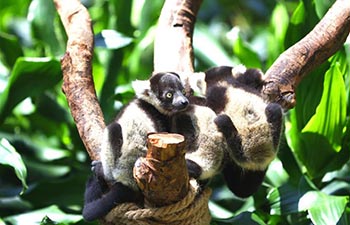CANBERRA, June 17 (Xinhua) -- The duck-billed platypus could hold the key to diabetes treatment, according to a German professor at the University of Adelaide in Australia, local media reported Sunday.
Professor Frank Grützner and his team have developed a synthetic form of the platypus hormone which stimulates insulin production in a test tube.
The discovery makes it a potential treatment for type-2 diabetes, an affliction which affects the body's ability to make insulin or becomes resistant to it.
"Millions of years of evolution have shaped (the platypus), fine-tuned it," Grützner told the Australian media on Saturday.
The male platypus, native to rivers of eastern Australia, has a heel spur that secretes venom - largely used to fight other males over breeding females - powerful enough to kill a dog.
Overlooked in the past, perhaps because it also causes intense pain in humans, the hormone could hold insulin levels steady over long periods, as it degrades a slower rate than in humans.
"You can weave these beautiful stories, but scientists have to go looking for evidence," Grützner was quoted as saying in the Sydney Morning Herald.
Grützner relocated to the University of Adelaide in 2005 in order to study the platypus, which, unusually for mammals, does not have a stomach.
Initially, he was part of the team that completed the first sequence of a platypus genome.
Among the sequence of genes that made up the platypus' insulin system, Mark Myers, a researcher at Federation University Australia, detected one gene that the platypus shares with humans.
The gene, known as GLP-1, stimulates the release of insulin and lowers blood sugar levels after consuming a meal, but crucially in humans, it breaks down quickly.
One of the current drugs that diabetics use, also a form of GLP-1, comes from the salivary glands of a Gila monster, a venomous Mexican lizard.
The team will now inject the platypus hormone into a diabetic mouse.
"And type 2 diabetes, it's a very big market," says Professor Patrick Sexton, a diabetes expert at Monash University who is collaborating with Professor Grützner's team on the venom research.
"The negative part is it's also a hugely busy space.
"There are people looking at a whole range of different ways to tackle this.
"But you never know what's going to be the thing that works."

















